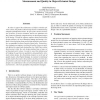Free Online Productivity Tools
i2Speak
i2Symbol
i2OCR
iTex2Img
iWeb2Print
iWeb2Shot
i2Type
iPdf2Split
iPdf2Merge
i2Bopomofo
i2Arabic
i2Style
i2Image
i2PDF
iLatex2Rtf
Sci2ools
131
click to vote
ICSM
2005
IEEE
2005
IEEE
Measurement and Quality in Object-Oriented Design
In order to support the maintenance of object-oriented software systems, the quality of their design must be evaluated using adequate quantification means. In spite of the current extensive use of metrics, if used in isolation, metrics are oftentimes too fine grained to quantify comprehensively an investigated aspect of the design. To help the software engineer detect and localize design problems, the novel detection strategy mechanism is defined so that deviations from good-design principles and heuristics are quantified in form of metrics-based rules. Using detection strategies an engineer can directly localize classes or methods affected by a particular design flaw (e.g. God Class), rather than having to infer the real design problem from a large set of abnormal metric values. In order to reach the ultimate goal of bridging the gap between qualitative and quantitative statements about design, the dissertation proposes a novel type of quality model, called Factor-Strategy. In c...
Related Content
| Added | 25 Jun 2010 |
| Updated | 25 Jun 2010 |
| Type | Conference |
| Year | 2005 |
| Where | ICSM |
| Authors | Radu Marinescu |
Comments (0)

